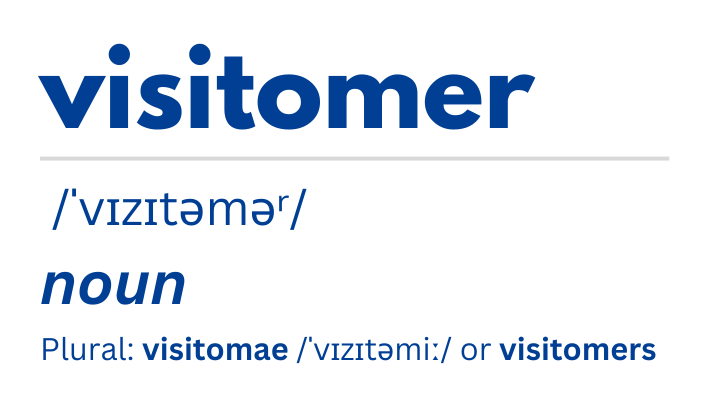A visitomer /ˈvɪzɪtəməʳ/ is a portmanteau of the words visitor and customer. It refers to a visitor who is a potential customer.
The plural form of visitomer is visitomae /ˈvɪzɪtəmiː/ but visitomers is also acceptable.
A visitomer is someone who has access your content, or is about to access your content, and is interested in your business or products. They may or may not make a purchase, but at least they are willing to learn about what you have to offer.

The word has been created by me because although online business startup and growth hacking are frequently discussed, the main theme of this site is affiliate marketing.
There is no direct business-customer relationship in affiliate marketing; Your aim is to get people to buy products, but your rewards for it come from businesses that sell them. Therefore, "customers" isn’t the right word to refer to these “people”.
The alternative words that you can use may be;
- “Audiences”
- “Visitors”
- “Viewers”
- “Consumers”
Those people are not necessarily “visit” your site or “view” your content unless you are in content marketing.
They may not necessarily be “consumers” either when you’re recommending products to your fellow business users. Whereas “audience” can sound patronizing, especially if you overuse the word.
In any case, we alternate between these words as they fit, therefore can also use the portmanteau “visitomer”.
Sentence Examples:
"Turning your social followers into your visitomae is challenging."
(Getting your social followers to visit your site and become interested in your affiliate products can be challenging.)
"He’s my visitomer-turned-competitor."
(He was my potential customer but has become my competitor.)
Why Overusing Words Can Be a Problem
Overusing certain words can really take away from what you're trying to say. It's like, when you hear the same word too many times, it starts losing its impact, right? It's a common thing we all stumble into. Sometimes, we latch onto specific phrases that just roll off the tongue easily. But, overuse can make you sound stupid.
Why Overusing Words Can Be a Problem
- Lack of Variety: Using the same words repeatedly can make your language sound monotonous. You want to keep things interesting, don't you?
- Weakens Impact: When a word is overused, it loses its power. It's like hearing a song on repeat; eventually, you just tune it out.
- Undermines Credibility: You know, if you keep using the same words, it might seem like you have a limited vocabulary. This could make others take your points less seriously.
- Reduces Clarity: Sometimes, overused words aren't the best fit for what you're trying to convey. This can lead to misunderstandings or a lack of clarity.
Tips to Avoid Overusing Words
Using the same words over and over can make our writings sound dull, right? Let’s break down some simple tips to keep our language fresh and interesting.
1. Expand Your Vocabulary
The more words you have, the better you can fix stuff, isn't it? So, learning new words is like adding new tools to your kit.
You can do this by reading different kinds of books, articles, or even listening to podcasts. Every new word you learn gives you another option for expressing yourself. Plus, it's pretty cool to know a bunch of different words, you know?
2. Read and Listen More
Picking up new words and phrases is easier when you hear or see them in action. Reading books, listening to podcasts, or watching movies exposes you to different styles and vocabularies. It's like being a detective, finding new and interesting ways people say things.
You might hear a cool new way to say something that's stuck in your head, and then, bam, you've got a new phrase in your arsenal, right?
3. Pause and Think
Before blurting out the first word that comes to mind, take a sec to think. Is there a better word you could use? Sometimes the easiest word isn't the best one for what you're trying to say. A little pause gives your brain a chance to find that perfect word. It's kind of like scrolling through your mental dictionary to find a gem, can't we all benefit from that?
4. Use Synonyms
Synonyms are like the secret sauce for spicing up your language. If you find yourself about to use the same word again, hit pause. Think of a synonym that can fit in there. It's like playing a word game in your head, you see?
For example, instead of saying 'happy' all the time, you could say 'joyful,' 'cheerful,' or even 'elated.' It keeps things interesting for you and whoever you're talking to.
5. Create New Words
Now, you can be a word chef – mix and match sounds and meanings to cook up your own words. Let’s say you need a word for something cozy and comfortable, but also stylish. How about 'cozystylish'? Tell your friends what it means, and who knows, it might catch on! Creative way to express exactly what you're thinking or feeling.
Plus, it's a blast seeing the looks on people's faces when you drop a brand-new word in conversation, you know? Visitomers. Much needed.

Great idea to create new words. I don’t understand half of the conversations my teenage daughters make with their friends. there’s no reason why we shouldn’t stop using conventional words and come up with made-up words regardless of our age. Visitomer I like that.
Thanks Benish for your comment. I agree with you 100%. Let us know when you come up with any words you think is more appropriate than the words that we tend to overuse.